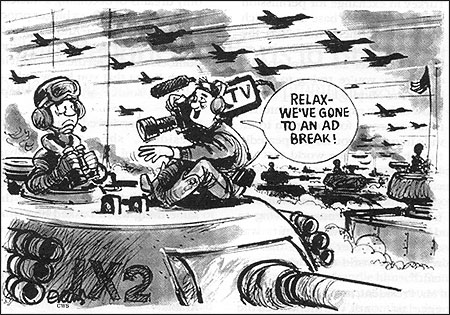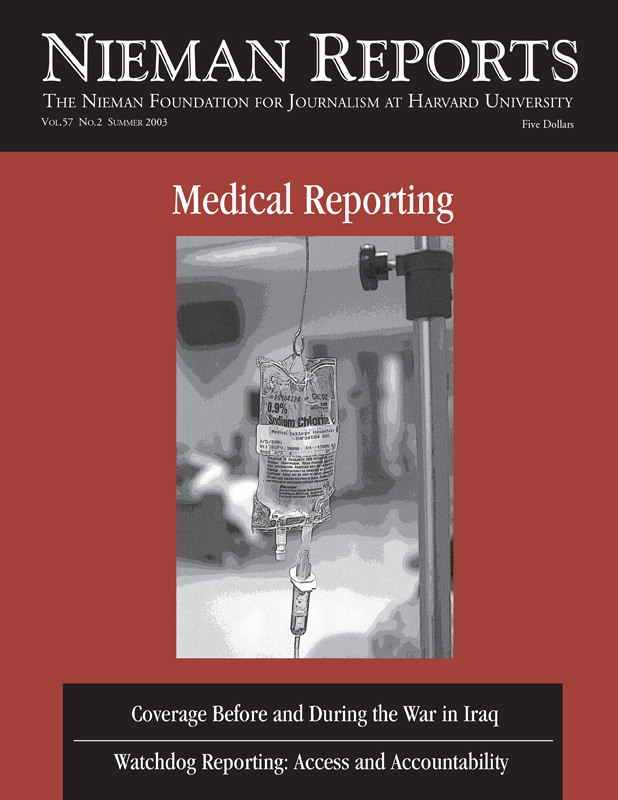Bob Edwards is the host of National Public Radio’s “Morning Edition.” Edwards, a Louisville native, was inducted on April 8 into the Kentucky Journalism Hall of Fame. That day, he gave the annual Joe Creason Lecture at the University of Kentucky. The (Louisville) Courier-Journal then adapted his remarks for an op-ed that it published. What follows are excerpts from that op-ed.
President George W. Bush has been in office for more than two years, and he’s held exactly eight news conferences. At the same point in his presidency, George Bush the elder had held 58 news conferences. Of the current President’s eight news conferences, only two have been in prime time.
But last month’s news conference was remarkable for more than the fact that it happened at all. Reporters were ushered into the East Room in pairs—summoned two-by-two, like the animals boarding Noah’s Ark. Once the news conference got underway, the President did not recognize reporters who raised their hands. Instead, he called their names from a list prepared by press secretary Ari Fleischer, the man who told reporters after September 11th that they should watch what they say. When CNN’s John King attempted to ask a question, the President told him to wait because, the President said, “This is scripted.” Then he called the next name on his list: John King. Then he taunted King for daring to ask a multi-part question. Among the names not called—and perhaps not on Ari Fleischer’s list of approved questioners—were the reporters from Time, The Washington Post, USA Today, Newsweek and Kentucky’s own Helen Thomas, who for decades has had the distinction of asking the first question and then closing the news conference by saying, “Thank you, Mr. President,” which became the title of her autobiography. But Helen is no longer a reporter. She’s now a columnist, paid to give opinions, and one of her recent opinions is that George W. Bush “is the worst President ever.” Clearly, she did not watch what she said. Another White House tradition, the follow-up question, also appears to be history.
We can fault the President and Fleischer for all that—and I certainly do—but they are only part of the dynamic. You can’t hold a press conference without the press, yet President Bush nearly did. Where were they that night? Some of those whose names were called might have bothered to ask a decent question. With the nation about to enter a war that’s decidedly unpopular everywhere but here, no one asked the hard questions. Instead, the President was asked if America should pray. He was asked if he worried in the wee small hours of the night. The first black reporter to get a chance to question the President since his decision to support a rollback of affirmative action asked him, “How is your faith guiding you?” One critic said this was the journalistic equivalent of, “Mr. President, you look great today. What’s your secret?”

Cartoon by Malcolm Evans, Auckland, New Zealand. Reprinted by permission of Cartoonists & Writers Syndicate/cartoonweb.com.
Questions I Would Have Asked the President
So, Bob, think you can do better? Well, yes, I do. So here’s what I would ask the President of the United States if he were here tonight:
“Mr. President, you’re asking for $76 billion to pay for this war, and you’ll probably go back to Congress to ask for more. Given the fact that there’ll be severe deficits for as long as you are President, why not let your tax cut slide?”
“You offered an attractive bribe to Turkey in exchange for permission to use Turkey as a base from which to invade northern Iraq. Was the vote of the Turkish parliament to refuse the offer an example of the democracy you’re trying to establish in the Middle East?”
“How did you expect to win international approval for your plan to invade Iraq when you have repeatedly told the rest of the world that the United States is ready to act alone in virtually every field, as witnessed by your withdrawal from international treaties and agreements having to do with the environment, war crimes, and other matters that the rest of the world considers important?”
“Mr. President, at your news conference last month, you mentioned the September 11th attacks no fewer than eight times, even though no one asked you about September 11th—they were asking you about the invasion of Iraq. The September 11th attacks were carried out by al-Qaeda and Osama bin Laden. Will you please elaborate on the connection, if any, between Saddam Hussein and Osama bin Laden who, if his videotapes are to be believed, has about as much affinity for Saddam Hussein as you do?”
“Mr. President, you have spent billions of dollars on homeland security to see the nation’s capital paralyzed by a North Carolina tobacco farmer driving his tractor onto the Mall. Did [Homeland Security] Secretary [Tom] Ridge miss a memo or two?”
“Does preemptive military action without provocation set a bad example for other countries who can claim actual provocation? India and Pakistan over Kashmir, for example? Greece and Turkey over Cyprus? South Korea, provoked almost daily by North Korea?”
“And speaking of North Korea, Mr. President, who is the worse dictator—Saddam Hussein or Kim Jong Il?”
“Kim is weeks away from turning North Korea into a nuclear power, if he hasn’t already done so. Saddam only dreams of becoming a nuclear power, so why is Iraq a bigger priority than North Korea? And why don’t you send your so-called precision bombers to take out the one plant in North Korea that you know to be a potential source of nuclear weapons?”
“When I interviewed your wife, Mr. President, she said the best byproduct of ousting the Taliban from Afghanistan was the liberation of Afghan women. Defense Secretary Donald Rumsfeld told me the same thing when I asked him what the United States achieved in its war in Afghanistan. If the liberation of Arab women is so important to your administration, then why is the United States not invading Saudi Arabia?”
“Sir, would you say your policy of noninvolvement in the Israeli-Palestinian conflict is working out? If so, for whom?”
“Is it possible that the war in Iraq will result in regime change in Great Britain?”
Well, that’s just a sampling of the questions I’d ask, though in more peaceful times I’d be likely to ask about labor laws, media ownership concentration, freedom of information, government secrecy, suspension of civil liberties, the environment, energy, corporate corruption and, most assuredly, health care reform.
Probing Questions and Patriotism
Now why are the tough questions not being asked? Do journalists wearing their flag lapel pins on TV not want to appear unpatriotic in time of war? The answer is yes. Av Westin said it very well last month. Westin goes back to the glory days of network television news. He was a producer at CBS for 20 years
and a producer at ABC for 21 more years. He said, “Since 9/11, the press has been watching the opinion polls almost as much as the administration, which explains why it has taken quite a while to assume the kind of normal adversarial relationship, much less the kind that was rampant during the Clinton years and the Nixon years.” He added: “There is a considerable amount of self-censorship going on in terms of pushing government officials on certain topics. But I’ve always believed our job was to ask questions that need to be asked, regardless of official reaction or public opinion.”
He’s absolutely right. Being popular might be good for business at a time when newspapers are losing readers and TV networks are losing viewers. And the owners of today’s media, who are business tycoons, not journalists, would like us to be good representatives of the corporate brands. But that is not our job. We are supposed to be surrogates for the public—the eyes and ears of citizens who don’t have the access we have. We are to hold public officials to account, and if that makes them angry at us—well, that just goes with our job, and we have to take it. If pointed questions make public officials squirm—well, that just goes with their job, and they’re supposed to take it. That’s the price that comes with the privilege of serving the people.
The press didn’t wait until the intern scandal to ask tough questions of Bill Clinton, so why is the incumbent getting a pass? The country deliberately decided not to have a king. We show the President some deference because of the office he holds. We call him “Mr. President.” It is NPR policy never to refer to an incumbent President by last name only. He is “President Bush” or “Mr. Bush”—but never just “Bush.” Yet he is not a king. He is a citizen temporarily serving us, living in our house, drawing our pay, spending our money, and acting in our name. We have the right and, yes, the duty, to expect him to perform at a high standard. If we don’t do this, we’re performing below the standard that should be expected of us.
When we were little, we thought it would be really cool to be a newspaper reporter or a TV or radio correspondent. Well, sometimes it really is cool. But we don’t deserve to enjoy the cool part of the job if we’re not willing to do the heavy lifting that sometimes comes with it. Public officials are measured by how well they perform in times of crisis. If they can’t take the heat, they should be in another line of work. It should be the same way with journalists. We cannot take a dive just because the country is at war. Indeed, our responsibility grows in times like these. It is not unpatriotic to expect the best from our leaders. Likewise, the public should expect no less than the best from us.



